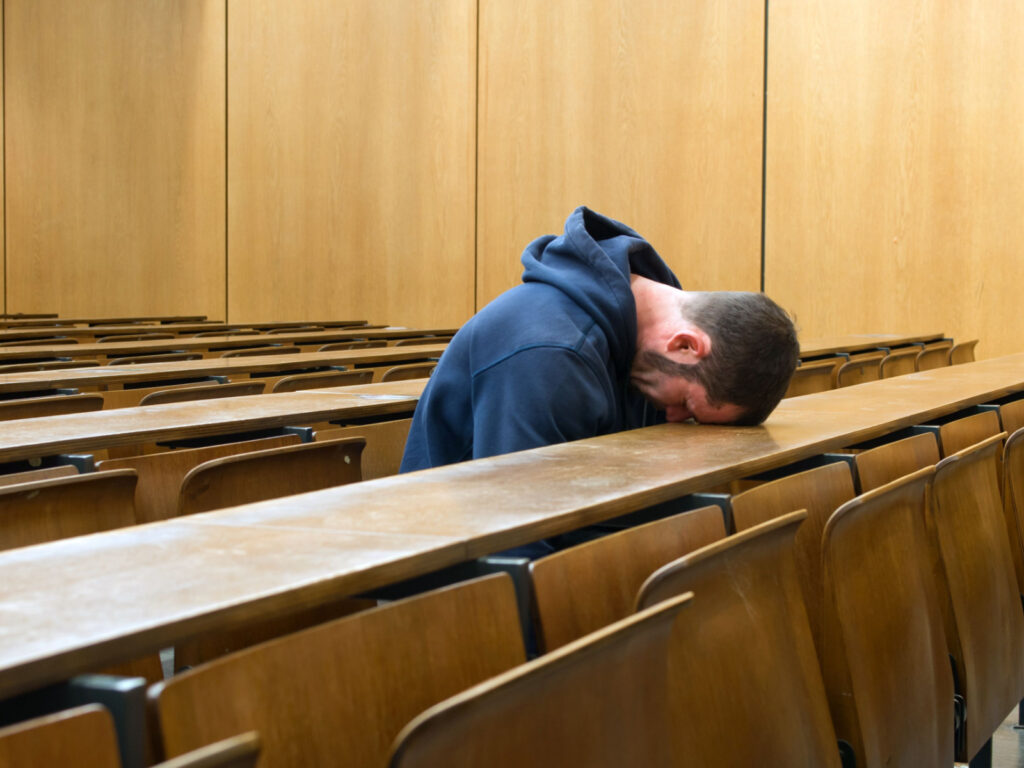11 Things Students Do in College: #9 is Real
The vast majority of college movies center on cheerleaders and jocks making out and partying as well as geeks and nerds wishing they would be invited to one of those cool shindigs.
Is college really like that in real life?
College is harder than high school in that the courses are generally more challenging, not to mention that students from different racial, social, cultural and religious backgrounds share the campus with one another.
But because college is a much larger world, undergraduate students have plenty of things to do — compulsory and non-compulsory alike.
About to build your college list and wondering what’s in store should you end up going to one of them? Read on!
Spend 15-20 Hours a Week Attending Classes
Just like what was mentioned above, college is more difficult than high school. But it’s important to note that there are also things that make it better than high school. Here’s one: less time spent in the classroom.

On average, undergraduate students spend 15 to 20 hours per week on classes.
High school students, on the other hand, usually spend anywhere from 25 to 30 hours per week on classes.
Due to this, teeners who are working on their undergraduate degrees have plenty of time to study as well as take care of an assortment of college-related tasks and activities, from writing essays to collaborating on a group presentation.
And it’s exactly because of having fewer classes why many college students aren’t all work and no play.
How much time college attendees devote to classes, of course, will depend on how many credits they enroll per semester — full-time undergraduates take not less than 12 credits a term.
Naturally, the more credits you enroll every semester, the more time you will have to spend in the confines of the 4 walls of the classroom.
But having more classes, each one usually comprised of 3 credits, per semester allows you to earn your bachelor’s degree faster than your peers.
Partake in Extracurricular Activities
High school grades and standardized test scores are some of the most important things considered in the college admissions process.
But college admissions officers, including those at many selective academic institutions, also take extracurricular activities (EAs) into account when reviewing applications.
It’s for the fact that they know very well that high school students who participate in EAs are less likely to get low or failing grades as well as drop out of college.
However, engaging in extracurriculars should not end after high school.
College students who join clubs and organizations acquire and develop skills that they may take advantage of during their undergraduate studies as well as after graduation.
It also gives them the opportunity to have a break from the monotony of higher education, thus helping to lower their stress levels, which can negatively impact academic performance.
So, should you include extracurriculars on your resume when it’s time to apply for a job?
You should!
Especially if they are relevant to the job position or industry, EAs can help give you an edge in the job market.

Date or Fall in Love (44% of Students)
An online poll revealed that about 15% of married people met their spouses in high school.
Worry not if you haven’t met yours throughout secondary school because there’s hope — plenty of it, actually.
That’s because the same poll showed that around 28% of married degree holders attended the very same colleges as their other halves.
But the number is lower in a study on recently married Americans: 15%.
No matter the case, the fact remains that college not just enables you to prepare for a future career but also lets you find love. Whether that love will lead to a breakup or a marriage, however, is completely up to both parties involved.
Despite having a lot of books to read, exams to ace, projects to submit and sleepless nights to make up for, most undergraduate students still have plenty of time for romance.
As a matter of fact, approximately 44% of college attendees are in a romantic relationship. Unfortunately for those who feel that they’re dating their soulmates, the relationship goes down the drain within 8 months at least.
The average length of a relationship in high school is 1 year. In college, on the other hand, the average is 4 times longer.
But although love can be an inspiration, it can also be a complete distraction in college!
Play or Watch College Sports
Professional athletes are employees receiving salaries from the teams they play for and companies whose products they endorse. On the other hand, collegiate athletes are just students playing sports.
Many of them know for a fact that they won’t have a professional career after college, which is why they tend to live in the moment and strive to shine while they have the spotlight on them.
Because of this, student-athletes tend to demonstrate more passion, which makes the games they play even more exciting for sports-loving students to watch.
Want to become a college varsity team member or simply a huge fan of college sports?
Then you might want to consider shortlisting some of the top 20 schools in Niche’s Best College Athletics in America:
- University of Florida
- University of Alabama
- Clemson University
- University of Oklahoma
- Louisiana State University
- University of North Carolina at Chapel Hill
- University of Southern California
- University of Connecticut
- Villanova University
- Ohio State University
- University of Maryland – College Park
- Florida State University
- University of Texas at Austin
- Michigan State University
- University of Georgia
- Baylor University
- University of Miami
- University of Virginia
- Auburn University
- Duke University

Hang Out With Friends (79% of Students)
Don’t feel despondent because you will soon bid your high school friends adieu.
In no time, you will be sharing the college campus with people from different states and countries and from varying cultural backgrounds, socioeconomic statuses and belief systems.
So, in other words, you are going to run into the kinds of people you might haven’t encountered in secondary school — you will never run out of new ones to befriend!
According to a study by the Elon Centre, 79% of adults found their closest friends in college.
So, in other words, you will be building a list of friends, potentially lifelong ones, after building a college list.
Alas, many young adults find it hard to make new friends as they adjust to college life and life away from home.
So much so that, based on a report by the Voice of America (VOA), 1 in 10 college graduates fail to make quality social connections.
But it’s worse for those who didn’t go to college: 1 in 4 say they have no close pals. This should alleviate your fears if you are nervous about college.
There are times, too, when you will hang out with friends not to have fun but to study. Studying with a group of individuals, including those who genuinely care about one another, is a great way to liven up study sessions.
It allows everyone to compare notes, exchange nifty study techniques and keep each other motivated.

Gel With Roommates
According to a report by The Washington Post, the US Department of Education (USDE) says that at least 87 institutions of higher education in the US require freshmen students who are enrolled full-time to live on campus.
Meanwhile, the Urban Institute, which is a Washington, DC-based think tank, gives the following figures:
- Almost 60% of students at private 4-year institutions live in college housing
- Approximately 36% of students at public 4-year institutions live in college housing
- Around 25% of full-time undergraduate students live with their parents
Got accepted to a college where first-time, first-year students must live on campus? See to it that you get to know your roommate, who could wind up as a support system and even best friend for life.
More often than not, colleges and universities provide incoming students with info about their respective roommates anywhere from 4 to 6 weeks in advance.
So, in other words, there’s no need for the academic year to officially start before you get acquainted with your roommate — feel free to email or phone him or her to introduce yourself.
But pace yourself as you have an entire year of getting to know one another and forming a strong bond.
Join a Fraternity or Sorority
Refrain from assuming that fraternities and sororities are all about partying and drinking and doing all sorts of stupid things as members do in college movies.
If truth be told, there are so many different benefits that being a part of Greek life can bring, some of which can work to your advantage not only during college but also after graduating from it.
As a matter of fact, up to 85% of individuals who work for companies on the Fortune 500, which is an annual ranking of the largest corporations in the US based on revenue, were college frat and sorority members.
Here are some of the lesser-known perks of going Greek:
- Leadership skills
- Organizational skills
- Academic support
- Alumni networking
- Social identity
- Community service
- Philanthropic opportunities
There’s one more benefit associated with being a member of a fraternity or sorority that you may find hard to believe:
According to the University of South Carolina, Greek members consistently outperform their classmates.
The following are the top 10 in Niche’s Best Greek Life Colleges in America:
- Florida State University
- University of Alabama
- University of Mississippi
- University of Illinois – Urbana-Champaign
- University of Georgia
- Pennsylvania State University
- Tulane University
- Florida A&M University
- Miami University
- University of Wisconsin

Attend Parties for 2-3 Hours
Like I said earlier, being a member of a fraternity and sorority is not just about partying. But it’s no secret that Greek letter societies tend to throw some of the best parties on campus.
It doesn’t necessarily mean, however, that you need to go Greek just to experience shindigs.
Especially if you are planning on going to one of the many party schools in the country, running out of parties to attend should be the least of your worries.
It’s completely normal and acceptable for late teens and young adults in college to party once in a while — it helps strengthen their confidence, independence and social skills.
According to Student Assembly, staying at a party for 2 to 3 hours allows undergraduates to enjoy enough opportunities to have fun and socialize without putting their sleep on the line.
The website also makes it clear, though, that you should avoid drinking alcohol unless you are of legal age as well as refrain from giving in to peer pressure if you are uncomfortable with doing drugs.
Of course, if the institution considers drinking and drug use severely punishable offenses, you should steer clear of them.

Rest and Sleep for 6 Hours
Health authorities say that most adults need 7 to 9 hours of sleep per night.
According to a report by the University Health Center of the University of Georgia, most college students, on average, get to enjoy only 6 to 6.9 hours of shut-eye nightly.
It adds that it can be blamed on an overload of higher education-related activities. The report says, too, that sleep deprivation can impact one’s GPA.
Some majors can cause sleep deprivation in undergraduates more than others.
To paint you a better picture, check out the following table that demonstrates the average number of hours of sleep students get based on their majors:
- Architecture (5.28 hours)
- Nursing (5.69 hours)
- Biochemistry (5.69 hours)
- Creative writing (5.75 hours)
- Ecology (5.75 hours)
- Linguistics (5.88 hours)
- Fashion (5.90 hours)
- Chemistry (5.92 hours)
- Sports science (5.92 hours)
- Music (6.00 hours)
- Anthropology (6.00 hours)
- Computer science (6.00 hours)
- Urban planning (6.01 hours)
- Physics (6.04 hours)
- Engineering (6.05 hours)
- Marketing (6.05 hours)
- Physical education (6.07 hours)
- International relations (6.08 hours)
- Animal science (6.08 hours)
- Philosophy (6.10 hours)
Work at a Job (74% of Students)
Because college costs tend to outdo inflation, it doesn’t come as a surprise that many undergraduate students in the US work on their bachelor’s degrees and at the same time work at a job to help pay for their studies.
As a matter of fact, according to data from the National Center for Education Statistics (NCES), around 40% of all college students enrolled full-time have jobs.
On the other hand, about 74% of all undergraduates enrolled part-time work. Compared to data from 2015, more college students lately are working.
It’s not all the time that working undergraduates have jobs outside of the campus.
Some of them are under the federal work-study (FWS) program, which requires them to work on campus to earn money that, unlike a federal student loan, doesn’t have to be paid back.
But it’s important to note that some students under the said program work off campus, too. The employers, in most instances, are private non-profit organizations or public agencies. No matter the employer, one thing remains true: the work performed is usually in the public interest.
Explore the Area
When building a college list, one of the things you should consider that many college-bound teeners don’t is the school’s location.
That’s because the culture and traditions of the town or city in which the academic institution is found can have a substantial impact on your overall college experience and even your academic performance.
And here’s another reason why location matters: opportunities for your future.
Enjoying better job marketability is one of the primary reasons why many work on an undergraduate degree. Getting hired after graduating from college allows one to pay off student debt, gain work experience and improve the resume.
Based on the analysis of Handshake of more than 13 million job applications all over the US, every region enjoys more than 50% retention in talent.
So, in other words, there’s an equal chance for you to remain in the same location as your alma mater after earning your undergraduate degree in order to build your professional career.
The sooner you get to know the vicinity, the better.
Doing so will enable you to determine right away whether or not there are plenty of companies around — the more there are, the more abundant the available jobs.
In fact, if you entered college as one of the 20% to 50% undecided, having an idea of some of the most flourishing industries locally might help point you to the right academic major.
And while still in college, exploring the area allows you to see what other fun, exciting, de-stressing and rewarding activities you can give a try other than on-campus ones.
Disclaimer: The views and opinions expressed in this article are those of the authors and do not necessarily represent those of the College Reality Check.





